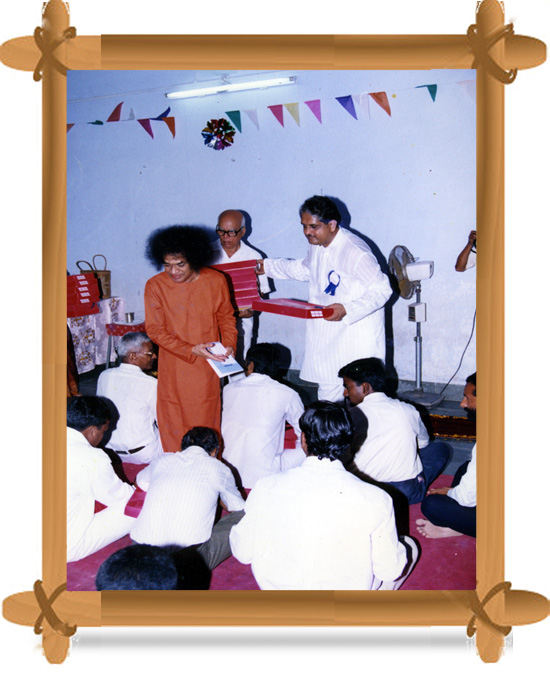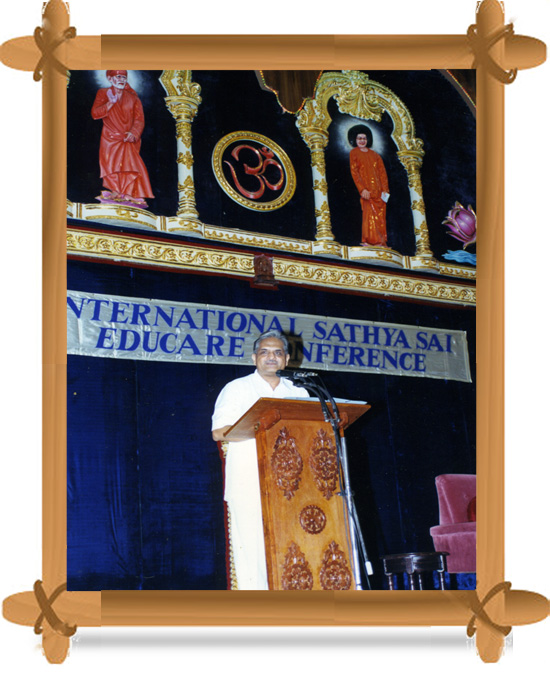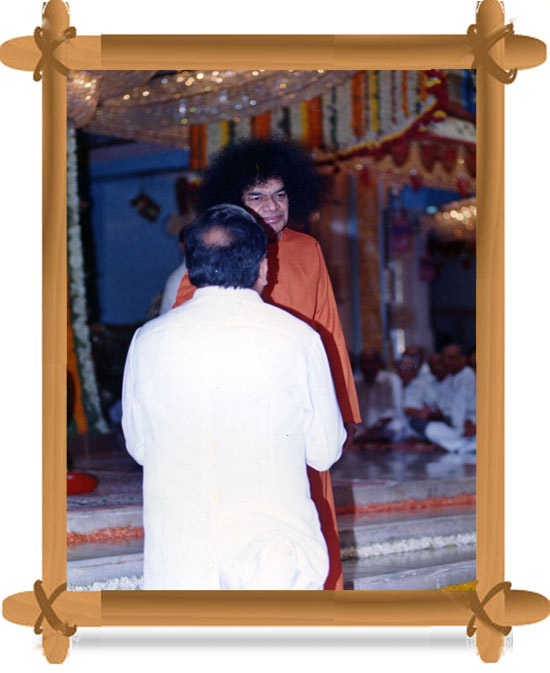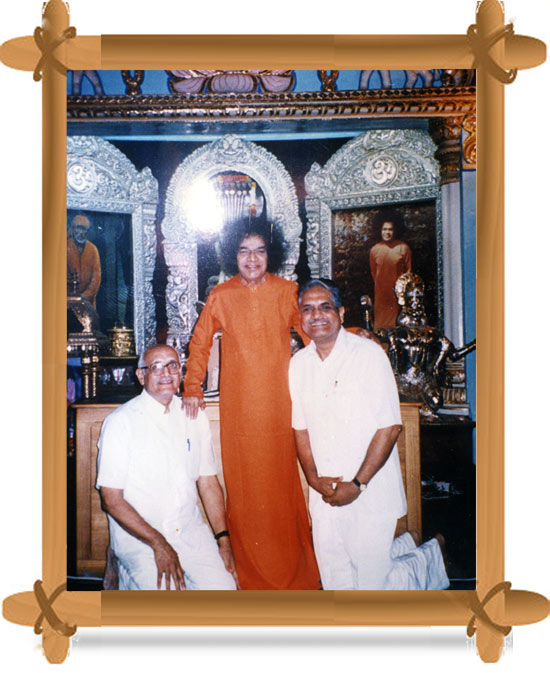|
|
| 'Like' us on Facebook | Follow us: |
Posted on: Apr 03, 2013
Law, love & life:
Learning it all from the lord
Conversation with Mr. Nimish & Mrs. Kamala Pandya
Part - 3
The Way to Balance Work and Seva is to Dissolve the Distinction
KM: You said that the weekends are dedicated to the work of the Sai Organization. That does not give you a day off to relax and rest then?
Kamala Pandya (KP): Change of your work pattern is in itself relaxation. Being with those children and listening to them is certainly not stressful. When you are involved in something that you don’t like or enjoy, then that becomes a source of stress. On the other hand, if you like something, then you yearn for it and you want to be a part of it. So, there is no question of needing a day off to relax.
KM: Earlier you said that the Bal Vikas classes have given you much. Could you explain in what ways?
KP: It’s good to see the children who once attended my classes are now married with their own families. It’s even more touching that children who were a part of my class much before I got married still write to me and say, ‘Aunty, you taught us this, we practice it even today’. Many a times, I would have forgotten what I taught in the Bal Vikas class, but my children never do. For them, it’s like the gospel. This is the joy that you get and what keeps you going. And, if those classes could change a child or a young adult’s life, then imagine how it would have impacted my own life?
 |
 |
 |
 |
 |
 |
 |
 |
| Outside Satyadeep, before the Bal Vikas Rally in Mumbai | |||||||
Nimish Pandya (NP): There is another dimension to this. According to me, if you choose to follow the path of Swami, then you cannot make distinctions between your worldly life, spiritual life or professional life. If everything that you do – from the time you wake up in the morning, when you take the first conscious breath and move into the day through the various interactions – if every action becomes focused on Swami and Swami’s way, then any sort of distinction vanishes. Then comes the question of priority – you ask yourself that in the 24 hours that you have ahead of you in the day, what would you like to do? Would you like to be useful to somebody else or will you be spending that time on yourself, on your own desires? All these priorities are valid – I would not for a moment say that personal desires or personal life or family life is not important. However, what is extremely important is how much time you allocate to each of these priorities.
For all Sai devotees and for anyone who is involved in the world of Sai or is in the process of experiencing Swami, I think the dimension of seva or the dimension of being useful to the society in any capacity is extremely important. The attitude to make other people happy and be happy yourself through adopting that attitude is key because that’s what Swami did all His life. Swami spent His entire life making people happy. People’s happiness was His happiness.
And if you take that as an attitude of your life, then everything becomes nice. Your interaction with your driver can be a very happy experience. You meeting people in the lift as you go up the building or when a kid comes and says hello to you, then you are a happy person. Exchanging a note with your servant is a happy situation. Or, saying hello to your colleague in the court is a reason for joy. When spreading the love that Swami spread becomes the focus of your life, distinction vanishes.
 |
|
KM: When you speak of this integration of different aspects of your life and bring Swami into all aspects of your life, don’t you confront a conflict of interests and values? Take your own profession, for instance. Swami would constantly joke that lawyers are liars! How do you explain that?
NP: It is a fact because it is said that the barometer of a great society or a healthy society is a weak lawyer. And, when you see a lawyer who is prospering and making good money, then it is said that he has made it at the cost of the society.
Swami has also said that 90% of the problems in the world today are caused by lawyers. In one of His speeches, he even said (angrily) that for the next seven generations and seven after that, your ancestors will all go to hell if you are a lawyer.
So, when Swami insisted that I become a lawyer, I actually used His argument against Him and said, “No Swami, you have said that you hate lawyers so much that you want to send seven generations of lawyers down to hell.” To that, Swami said, “No, no you don’t worry I’ll take care of you, you become a lawyer.”
KM: You received divine immunity from Swami.
NP: So the conflict of interest arises when the legal profession becomes one of money generation.
If you want to regard your profession with a get-rich quick approach, no one can help you and you will but naturally go down the dungeon. Alternatively, when you say, ‘no I am not bothered about the money but I shall stick to my ethics, and shall speak the truth even at the cost of losing a client’, then you will be saved from perdition.
"Swami Taught Us the Value of ‘Value’"
KM: Have you ever lost clients because of sticking to your ethics?
NP: I may have lost many clients but I never worry because I make money or get work by virtue of my reputation as a good and honest lawyer. Unfortunately, in the world today there is a dearth of lawyers whose integrity is unchallengeable. Such a group of good lawyers with high moral values and integrity is a rare species.
KM: So, you carved a niche for yourself with your honesty and integrity?
NP: It’s important to carve that niche because you must support truth and you must be a part of truth to be able to reflect it in your ethics.
KM: And you can still make money while doing that.
NP: Swami has taught us that money is incidental.
He has always instilled in me the value of ‘value’. As a young man, I was naturally drawn to the concept of making money, I wanted to be a millionaire, my own bungalow, a Mercedes and all of those trappings. Knowing this chain of thought, Swami caught hold of me one day and said, “Look, money is like a shoe. If your size is 6, you better wear a shoe which is 6. If you wear 7, you will trip and fall and if you have 5, it will pinch you. Therefore, money is like a shoe - you must have only enough and as much as you need. If you have more, you are in trouble.”
KM: And you both, as husband and wife, agree with this philosophy?
 |
|
| Speaking at the International Sri Sathya Sai Educare Conference at Poornachandra Hall in Prasanthi Nilayam |
NP: Yes, because it gives you so much of clarity and you are convinced that work and the quality of happiness that you give people is what will ultimately bring you the money. If you make money at the cost of making people unhappy, you are not ever going to succeed.
KP: We are very forthright when we deal with our clients. We make the challenge and outcomes of their case very clear to our clients, right from the beginning. If the case is weak, we do not hesitate in saying so and ask them if they would still like to go ahead and fight it. Only when they are convinced that they would like us to represent them, knowing fully well the odds against them that we take up the case. We take this approach because we’d much rather lose a client than be told that we didn’t do a good job.
In other words, you need to have strength of character to tell your clients on their face right at the start about how high their chances are of winning the case or vice versa.
KM: That’s a good piece of advice for potential lawyers.
KM: We also don’t take up cases where we know that we’ll be required to compromise on our ethics. Luckily for us, we deal mostly with company matters, where everything is black and white and there is no hidden agenda.
NP: We believe that the only way to love Swami is to be true to your conscience, and if you can live with the voice of your conscience on a day to day basis, then you will always have Swami’s grace.
KM: At all costs and every time.
NP: At all costs and without fear. If you identify the voice of conscience and put its words into action, that is dharma. And it’s important that your dharma must give you peace of mind. I cannot be having something in my heart, something on my mind and something else on my tongue – Swami has always been against such conflicting emotions and thoughts.
KM: In your case, what then happened to your desire for a bungalow, the Mercedes?
NP: You get everything at the right time.
KM: In its own time?
KP: In fact, it came without us wanting it.
NP: And I must confess that whatever worldly treasures that I may have acquired today are not something that I have ever strived for.
And that was another lesson that Swami has imparted. When He gave me the example of the shoe, he told me not to run after money. He said, “I give you enough, and you will get what you need”. Now, that’s the satisfaction man must have. Such satisfaction will come only with self-confidence, and self-confidence will come only to those people who put their conscience into action.
What it Takes to be 'Sai Baba Lawyers'
KP: Take for instance, divorce matters.
I always advise our clients not to fight if they have made up their mind not to live together. We tell them to come to a peaceful conclusion, without having to drag it to the courts. Despite us telling them, if some couples still want to fight, we send them to another lawyer because we refuse to wash their private linen in public. I had a case of a woman, where I told her to take whatever her husband was willing to give her and let him get out of her life. But, she refused to listen to me; she wanted to fight to a bitter end. The case dragged on for ten years. She lost so much money and she ended up with some measly two lakhs! Her two year child turned twelve by the time the ruling was passed. She had seen the mother go through enormous stress; she had seen the father coming to the house to spend some foolish two hours with her. In the end what happened? This woman was back to square one. If she had taken those two lakhs some ten years back, she would have made a fresh start for herself. The rest of the ten years would have been worth much more.
 |
NP: Swami was a fantastic marriage counsellor. We have used Swami’s advice several times in our professional life.
I remember on the day when we were getting married, Dr. Rajeswari from Bangalore was marking her husband’s death anniversary. The situation in the interview room was almost ironical - on one side there was a wedding being performed, while on the other, a death anniversary was being marked. So, you had separation and you had union taking place at the same time, with Swami masterminding both scenarios.
Dr. Rajeswari was upset, and I remember Swami telling her, “Amma, why are you worried? What was he before you got married to him? When he was a young boy, he fell down, he got hurt, you didn’t know him then so it didn’t bother you. So, after death too, what is he to you? He was nothing to you before marriage and he is nothing to you now after death.” Bhagawan gave such an in-depth explanation of our transient relationships. I have used the same explanation to many people in my professional life. The only difference, I made a lot of money on Swami’s advice!
KM: Without paying royalty.
NP: I suppose I have to pay the royalty to Swami someday. Swami will take it from me in a way that only He can.
KM: Both of you live a life of such deep commitment to Swami. How do your peers in the legal fraternity view the many worlds you both straddle?
KP: They call us the Sai Baba lawyers.
KM: In a complimentary way, I’m sure
NP: They do respect our conviction. Normally, in every profession you have a peer group. For instance, you have a press club for journalists. In the legal fraternity, it’s called the Bar. Very steadfastly, Kamala and I never became a part of such a group. We stayed clear from any peer pressure that would come on to us of any kind. I would never attend a party of lawyers or a party thrown by our judges. I have never been to any functions of any bar or any law firm. So, I became a little aloof, and exclusive. In a sense, Kamala and I are lawyers who are there and yet are not there. This approach has worked well for us. It gave me good stature and respect in my profession, and soon became known that we would not succumb to any kind of peer pressure or herd mentality. We made a conscious decision to anchor ourselves to Swami rather than anchoring ourselves to the society.
KM: It must call for lots of self-confidence to take that stand when you want to be a part of the profession without pandering to the socializing and the networking demands. Doesn’t that put you at a disadvantage?
KP: I think we had the Divine grace more than self-confidence - 90% grace and 10% self-confidence. We were fortunate that good work just flowed in, work that gave us a strong standing in the society.
NP: I would say we are examples of people who have not gone out to seek work. Networking is a word that I don’t believe is required in the world of Sai. It’s all to do with being good at your work. And, when we say Sai, I would like to stretch the concept further as Swami now represents the principle of Godhead. If today’s young people accept the principle of Godhead and learn to trust it, then it’s possible to get everything that we want in the world. And that’s what Swami wants all of us to do - to cling on to the God principle. Only then will Grace flow through every aspect of our lives.
One Can Stick to One's Principles Even in Today's world
KM: You make it sound so easy but living in contemporary India, it almost seems impossible to get through a day, to get a job done without compromising on your values as corruption is so rampant.
 |
|
| After the Sri Sathya Sai Educare Programme for the Police Force of Andhra Pradesh, Mr. B. G. Pitre and Mr. Nimish Pandya with Swami in the Prasanthi Mandir |
NP: That’s true. On the flip side, it’s important to know that corruption bothers you only when you have done something or you want to get something done in a manner where you want to please another person. I try to avoid areas that would require me to be corrupt or represent a corrupt situation.
KM: Let me give you a scenario. If you go to a municipal office and want a simple thing as a death certificate, the clerk in the municipal office says, ‘unless you bribe me I’m not going to give it to you anytime soon’. So either you bribe him and get the job done, or you keep going back over and over again and get to hear things like the clerk is on holiday, his boss is not available to sign off the certificate or the certificate is not ready, please come back tomorrow… you could just spend six months going back and forth waiting for a simple document to be processed.
How do you see this sort of attitude?
NP: To explain this point, let me give you two examples. I lived in an apartment in Mumbai where I wanted to get some internal modification done so I would have two floors (like a duplex apartment) with the private living space on the top floor and my office on the lower floor.
Now, this is a complex task to accomplish in an existing building, given the permissions that would be needed from the corporation set up in Mumbai. I was determined to get my way. My father and I also decided that we would not resort to anything illegal. We made the necessary applications and I got the right people to speak to the right individuals at the corporation. Yet, it took me one and a half years to secure the permission. It demanded me to be patient but I didn’t bribe anybody and allowed the officials to follow their process. I would visit the office frequently and when told that they were unable to find my file, I’d calmly tell them that I would return in 15 days and hope the file is located by then. Not only was I patient, I was very loving and never lost my temper even once. At the end of one and a half years, the officer himself contacted me and said, ‘Sir, permission has been granted. You can go ahead and make the modifications.”







